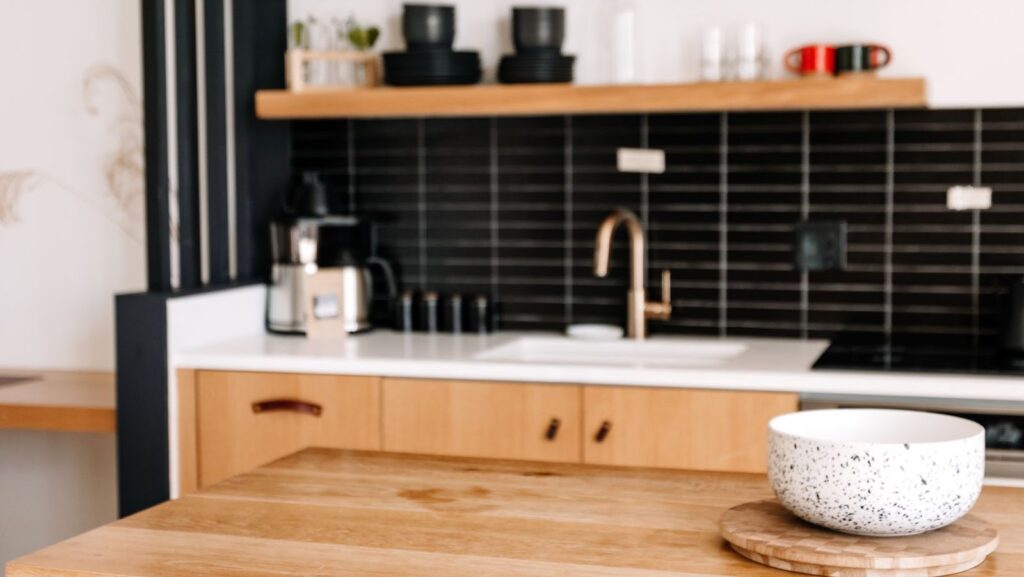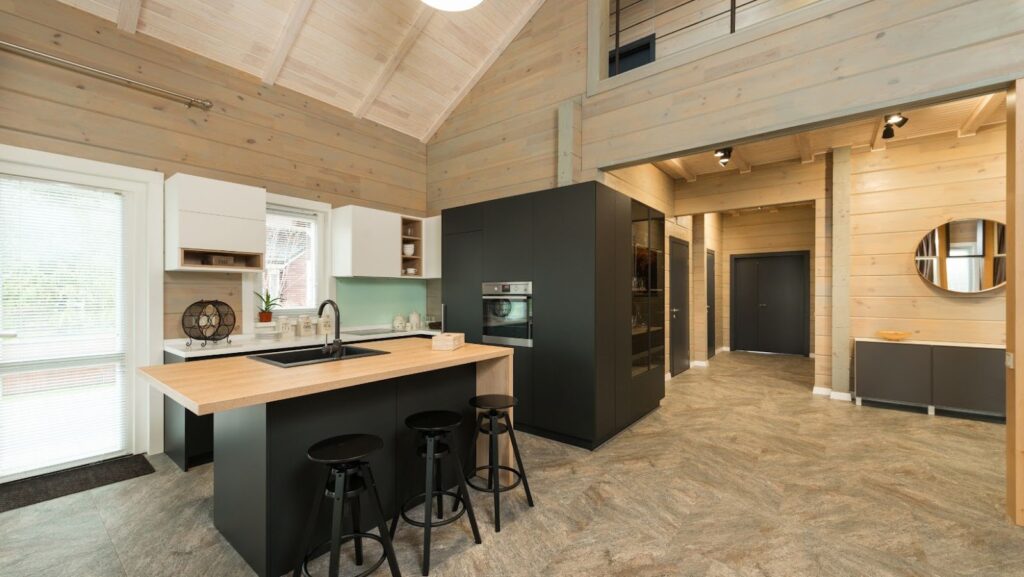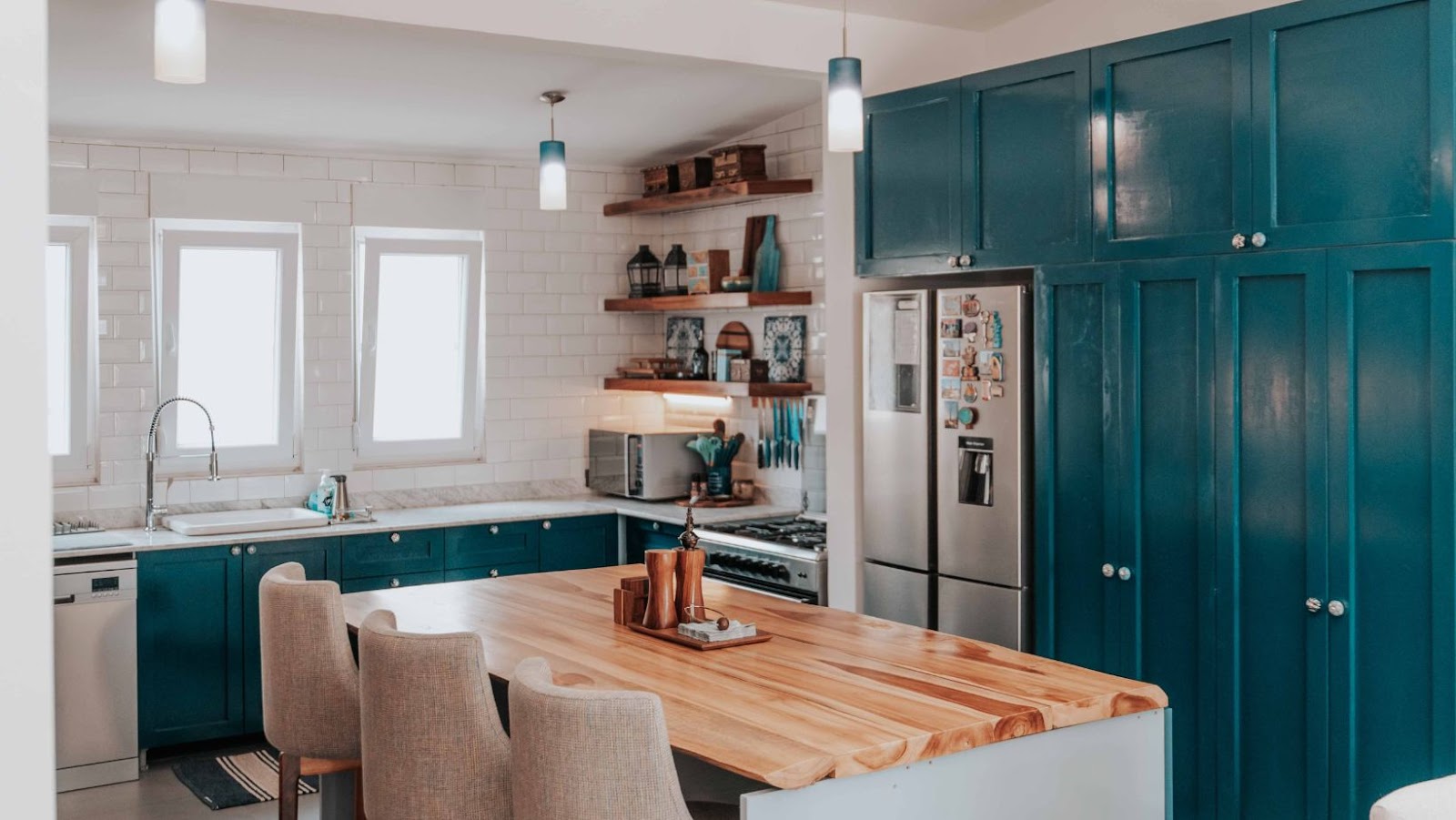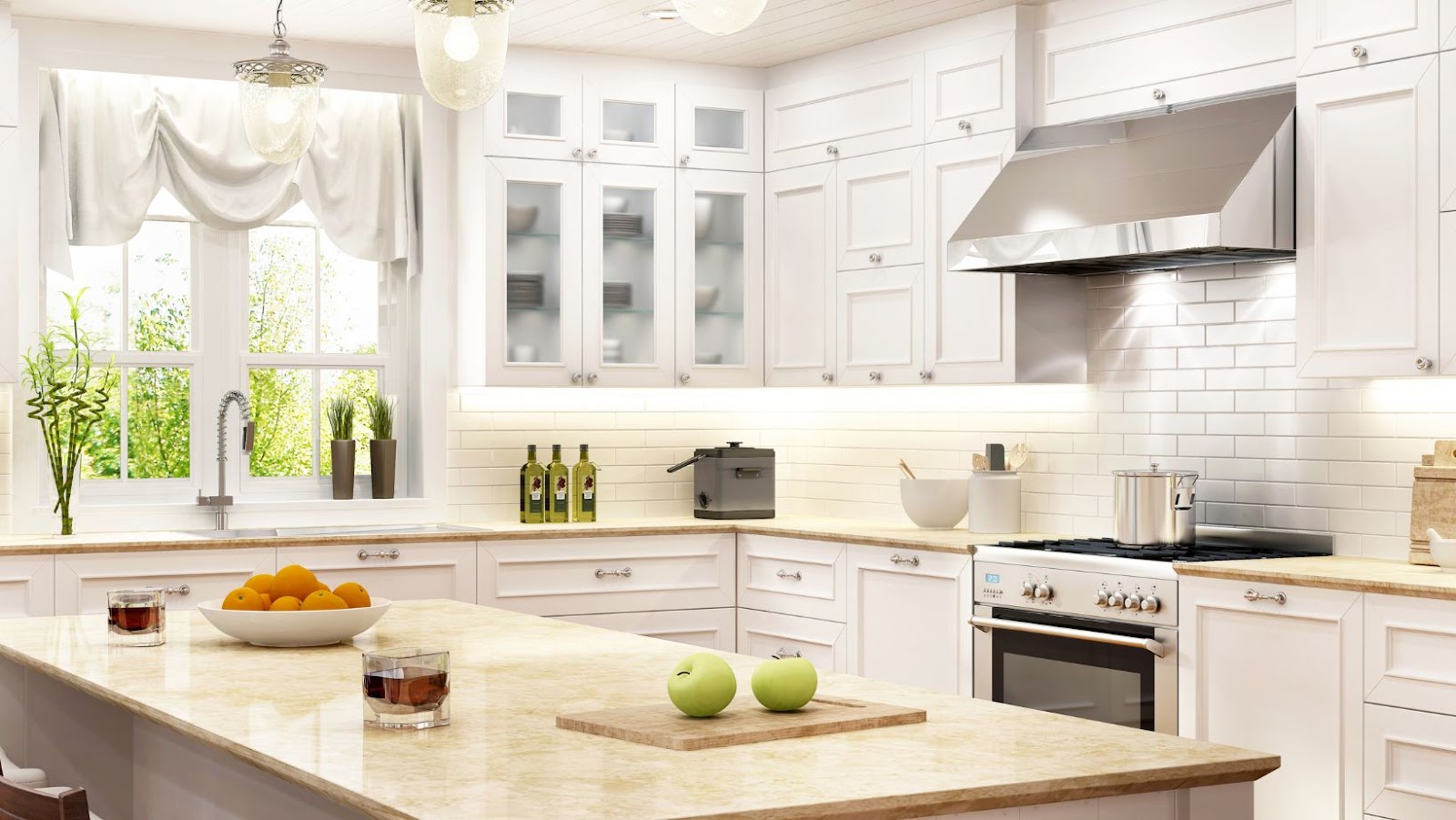How to get the Most out of a Cheap Kitchen Island
 Choosing the perfect countertop for your kitchen island is crucial as it serves both functional and aesthetic purposes. The ideal countertop should be durable, easy to maintain, and fit in with the overall style of your kitchen.
Choosing the perfect countertop for your kitchen island is crucial as it serves both functional and aesthetic purposes. The ideal countertop should be durable, easy to maintain, and fit in with the overall style of your kitchen.
Here are some different types of countertops to consider when building your kitchen island:
Granite: Granite is a popular choice for kitchen countertops due to its durability, heat-resistance, and wide variety of colours and grains to choose from.
Marble: Marble countertops give a luxurious look to any kitchen with their unique veining and colours. However, they require regular maintenance and are prone to staining.
Concrete: Concrete countertops are highly customizable with a variety of finishes and can easily incorporate cutting boards, sinks, and drainboards.
Wood: Wood countertops add warmth and character to a kitchen and are ideal for food preparation. However, they require regular maintenance and can easily scratch and burn.
Stainless Steel: Stainless steel countertops are durable and easy to clean, making them ideal for an industrial-style kitchen.
Choose the countertop material that suits your lifestyle and budget, and complements the overall design aesthetic of your kitchen.
Factors to Consider Before Choosing a Countertop
When selecting a countertop for a kitchen island, there are many things that need to be taken into consideration. While aesthetics and style are important, functionality and durability should also be taken into account.
In this article, we will discuss the factors to consider before choosing a countertop for your kitchen island.
Budget
Budget is a vital factor to consider when choosing the right countertop for your kitchen island. The type of material you choose will have a significant impact on the overall cost of the project, making it essential to find a balance between quality and affordability.
Here are some tips to keep in mind when creating a kitchen island on a budget:
1. Opt for affordable materials such as laminate or butcher block, which can be less expensive than high-end options like granite or quartz.
2. Look for countertops with imperfections, such as scratches or chips, that can be repaired or covered up with an overlay, rather than replaced entirely.
3. Consider the size and shape of your kitchen island, as larger or uniquely shaped countertops will cost more to install and require more material.
By following these tips, you can create a beautiful and functional kitchen island at an affordable price.
Durability
Durability is a crucial factor to consider when choosing a countertop for your kitchen island. It’s important to choose a material that can withstand daily wear and tear, without compromising on its aesthetic appeal.
Here are some materials that offer exceptional durability:
Granite: Granite is a natural stone that is extremely durable and scratch-resistant. It also offers a polished finish that adds a touch of elegance to your kitchen island.
Quartz: Quartz is a man-made material that is resistant to scratches, stains, and heat damage. It’s the perfect choice for a busy kitchen island as it offers both strength and style.
Concrete: Concrete offers unmatched durability, making it ideal for a kitchen island that doubles as a workspace. It can also be customised to fit any shape, giving you the freedom to design a unique island that suits your needs.
Stainless Steel: Stainless steel is not only stain and heat-resistant but is also easy to clean. It’s an excellent choice for an industrial-style kitchen island that requires a sleek and modern finish.
Butcher Block: Butcher block is a sturdy and durable option that adds warmth and character to your kitchen island. It’s the perfect choice for a rustic or country-style kitchen island.
Design
Designing a kitchen island entails choosing the right countertop that both complements your kitchen design and suits your needs. When selecting the perfect countertop for your kitchen island, consider the following factors:
1. Budget: Countertops can vary in price from affordable to high-end. Determine your budget before selecting a material.
2. Durability: Consider the durability and maintenance requirements of each material. Some materials may require special maintenance or cleaning techniques to maintain their appearance and function.
3. Aesthetic: Choose a countertop that complements your kitchen design and adds to the overall look and feel of the space.
4. Functionality: Consider your kitchen island’s purpose and select a countertop that aligns with its intended use. For example, if you frequently cook or bake on your island, consider a heat-resistant material.
By evaluating these factors, you can confidently select a countertop that meets your needs and enhances your kitchen aesthetic.
Popular Countertop Materials for Kitchen Islands
Having a kitchen island with a durable and stylish countertop can add a great deal of style and practicality to your kitchen. But when it comes to countertop materials, there is a wide range of options available depending on your needs and budget.
In this article, we will be looking at the most popular countertop materials for kitchen islands and their characteristics to help you make an informed decision.
Granite
Granite is a popular countertop material for kitchen islands because of its durability, natural beauty, and resistance to heat and scratches. Here are some tips on how to choose and care for a granite countertop for your kitchen island:

Choose the right thickness: Most granite countertops are available in 2-3 cm thickness. A thicker slab is more durable, but it also adds more weight to your kitchen island. Consider your kitchen island’s size and weight capacity before selecting the granite thickness.
Choose the right colour and pattern: Granite comes in a wide range of colours and patterns, so it’s important to select one that complements the overall aesthetic of your kitchen. Consider the cabinet colour, wall colour, and flooring before making your selection.
Proper care: Avoid using harsh chemicals or abrasive cleaners on granite surfaces, as it can damage the polish and sealant. Use a mild cleanser or warm water with soap to clean your countertop. Also, use trivets or hot pads to avoid direct contact with hot dishes or cookware on the surface.
Pro-Tip: To prolong the life of your granite countertop, consider sealing it every 1-2 years to prevent stains and damage.
Pros
There are many pros to consider when choosing the right countertop material for your kitchen island. Here are a few:
Durability: Kitchen islands are high-traffic areas that are exposed to spills, scratches, heat, and other wear and tear. Choosing a durable countertop material such as granite, quartz, or stainless steel ensures that your island can withstand daily use and last for years to come.
Aesthetics: A kitchen island is often the focal point of the room, and choosing the right countertop material can enhance your kitchen’s overall look and feel. Whether you want a sleek and modern look with stainless steel or a more natural and rustic look with wood or stone, there are countless options to choose from.
Functionality: Some countertop materials are better suited for specific tasks than others. For example, marble is great for rolling out dough, while butcher block is ideal for chopping and cutting. Consider your cooking habits and choose a material that complements your needs.
Pro tip: When choosing a countertop material for your kitchen island, be sure to take your time, research extensively, and consult with experts to ensure that you make an informed decision that best suits your needs and budget.
Cons
While there are many pros to choosing different materials for your kitchen island countertop, there are also cons to consider before making a decision. Here are some cons to keep in mind for popular materials:
Granite: While very durable, granite may crack or chip if a heavy object is dropped on it, and it requires routine sealing to prevent stains.
Quartz: Although extremely resistant to scratches, quartz is not heat resistant and can be damaged by excessive heat.
Wood: Wood countertops are prone to scratches and dents, and require regular oiling to maintain their finish.
Concrete: Concrete is susceptible to cracking and staining, and requires routine sealing to prevent damage to the surface.
Marble: Marble is a beautiful and classic option, but it is very porous and prone to staining, scratching, and etching.
It is important to weigh the pros and cons of each material before choosing the right countertop for your kitchen island.
Marble
Marble is a popular countertop material for kitchen islands, thanks to its durability, natural beauty, and sleek profile.
Here are some tips on using marble as your kitchen island countertop:
- Choose high-quality marble, as it is less likely to scratch, chip, or stain.
- Apply a sealant to prevent staining and etching from acidic substances, such as lemon juice or vinegar.
- Avoid placing hot pots and pans directly on the marble surface, as it can cause damage or cracking.
- Regularly clean the marble with a mild soap and warm water, wiping away any spills or stains quickly.
If you’re considering a DIY kitchen island project, you can create a marble countertop by purchasing pre-cut marble slabs or tiles and installing them onto a wooden base using adhesive and grout. Pro tip: Before installing your marble countertop, test it for porosity by dropping a few droplets of water on the surface. If it beads up, you’re good to go! If it absorbs into the surface, you’ll need an additional sealant layer.
Pros
Choosing the right countertop material for your kitchen island is crucial for both functionality and aesthetics. Here are the pros of the most popular countertop materials to help you make an informed decision:
Granite: This material is durable, heat-resistant, and scratch-resistant, making it ideal for home kitchens. Granite countertops come in various colours and patterns, making them versatile design-wise.
Marble: Known for its luxurious look and smooth surface, marble is a popular choice for homeowners who want breath-taking countertops. Marble is also heat-resistant.
Quartz: Quartz countertops are non-porous, scratch-resistant and easy to maintain. They are available in a wide range of colours and patterns, giving homeowners numerous options to choose from. Another perk of quartz is that it is low maintenance compared to other materials.
Butcher Block: Butcher blocks are naturally warm and inviting and lend themselves to a farmhouse or cottage-style kitchen. They are also food-safe, waterproof and very durable. Butcher block is functional, attractive, and relatively low maintenance.
Concrete: Concrete countertops are heat-resistant, scratch-resistant, and versatile in terms of design. They are durable but require a sealer to be applied every few years to maintain its look.
Choosing the right material is a personal choice that comes down to durability, price, and style preferences.
Cons
While there are many benefits to using natural stones, such as granite or marble for countertops, there are also a few cons to consider before making your final decision.
Here are some of the cons to using natural stone for your kitchen island countertop:
- Cost: Natural stone is one of the most expensive countertop materials you can choose for your kitchen island. The cost per square foot for granite or marble can add up quickly.
- Porosity: Natural stones are porous, which means they can easily absorb liquids and oils. This makes them susceptible to staining and bacterial growth if not properly sealed and maintained.
- High Maintenance: To keep your natural stone countertops looking their best, they require regular resealing and cleaning with special products. Failure to do so can lead to costly repairs or replacement.
- Heavy: Natural stones are heavy and require professional installation, which can add to the overall expense of your kitchen island project.
Consider all the pros and cons of each countertop material to make sure you get the right one for your kitchen island.
Quartz
Quartz is a popular material choice for kitchen island countertops due to its durability, low maintenance, and aesthetic appeal. Here’s why quartz is a great option for your kitchen island:
Durability: Quartz is one of the hardest naturally occurring minerals, making it resistant to scratches, chips, and stains. This means it can withstand heavy use and last long without damaging easily.
Maintenance: Unlike natural stones such as granite and marble, quartz countertops don’t require sealing or polishing to maintain their quality. They’re also easy to clean with warm, soapy water.
Aesthetics: Quartz countertops come in a variety of colours and patterns that mimic the look of natural stone. This makes it easy to match your kitchen island’s style and colour scheme. Additionally, quartz countertops are non-porous, which means they don’t harbour bacteria, making them a hygienic option for kitchen use.
Pro Tip: When choosing quartz for your kitchen island, make sure to select a thicker slab, such as 3 cm, to avoid the risk of cracking, particularly for larger kitchen islands.
Pros
When it comes to choosing the right countertop material for your kitchen island, there are a variety of options to consider. Here we will discuss the pros of popular countertop materials to help guide your decision.
Granite: This natural stone has a luxurious appearance and is highly durable, resistant to heat and scratches. It’s also available in many colours and patterns.
Quartz: Made of engineered stone, quartz is highly durable, non-porous, and comes in a wide variety of colours and finishes. It’s also low-maintenance, resisting stains and scratches.
Marble: This natural stone is highly sought after for its beautiful veining and unique aesthetic appeal. It’s a heat-resistant material.
Wood: Wood countertops are beautiful and add warmth to a kitchen. They are highly durable and easy to install.
Stainless Steel: This durable material has a sleek, modern appearance and is highly resistant to both heat and bacteria.
Choosing the right countertop material for your kitchen island will depend on your personal taste, budget, and lifestyle.
Cons
While there are several popular countertop materials for kitchen islands, each has its own set of cons to consider before making a final decision.
Granite: This material is durable and heat-resistant, but it can be expensive and porous, making it susceptible to stains.
Marble: Marble offers a classic, sophisticated look, but it’s not as durable as other materials and can scratch, stain, and chip easily.
Quartz: Quartz is non-porous, resistant to scratches and stains, and comes in a variety of colours and patterns. However, it can be more expensive than other options.
Butcher block: This material is affordable and adds warmth to any kitchen. However, it requires extra maintenance, including frequent oiling and sanding, and it’s not heat-resistant.
Stainless steel: Stainless steel is durable, easy to clean, and heat-resistant, but it can scratch and show fingerprints easily. It’s also more expensive than some other options.
Concrete: Concrete offers a modern, sleek look, but it’s heavy, porous, and prone to cracking and chipping over time. It’s also not as heat-resistant as other materials.
Considering the cons of each material will help you make an informed decision and select the right countertop for your kitchen island that meets your specific needs and preferences.
Butcher Block
Butcher Block is a popular choice for kitchen island countertops due to its durability and versatility, making it an excellent investment for any kitchen remodel project. Here’s how to make a kitchen island with a butcher block countertop:
Choose a butcher block countertop in your desired size and style.
Install supporting brackets on the corners of your kitchen island cabinet.
Place the butcher block on top of the brackets and secure it in place with screws.
Apply a food-grade mineral oil or butcher block conditioner to the surface of the countertop to protect and seal it.
Butcher block countertops are easy to maintain and can last for many years with proper care. Pro Tip: Use a damp cloth and mild soap to clean the surface of your butcher block regularly, and avoid exposing it to excessive moisture or heat.
Pros
There are several pros to consider when choosing the countertop material for your kitchen island, which can help make your decision easier and more informed.
Granite: Granite is a popular choice for its durability, resistance to heat, and its polished finish that improves with age. Granite countertops don’t scratch easily, are easy to clean, and come in various colours and styles.
Quartz: Quartz countertops are stain-resistant, low-maintenance, and mimic the look of natural stone. They’re available in a wide range of colours and patterns, making them a versatile option for any kitchen.
Marble: Marble countertops have a classic look and are ideal for bakers who need a cool surface for kneading dough. They’re also resistant to heat and add value to your home.
Stainless Steel: Stainless steel countertops are durable, heat-resistant, and easy to clean. They’re perfect for modern and industrial-style kitchens and add a sleek, polished look to your space.
Butcher Block: Butcher block countertops are affordable and can be sanded and resealed to eliminate scratches and stains. They’re ideal for cutting and chopping and add a warm, natural look to your kitchen.
Each of these materials has its advantages when it comes to a kitchen island, so it’s essential to weigh your preferences and lifestyle when making your choice.
Cons
While there are many pros to choosing popular countertop materials for kitchen islands, there are also a few cons to consider before making your final decision.
Here are some of the cons to keep in mind:
Cost: Many popular countertop materials are expensive, which can add up quickly if you have a large kitchen island or want a unique design.
Maintenance: Some materials, such as natural stone, require regular sealing and maintenance to keep them looking their best.
Durability: While many popular countertop materials are durable, some are more susceptible to scratches, stains, and heat damage than others.
Pro Tip: Consider the overall design and purpose of your kitchen island when choosing a countertop material. If you plan on using it as a prep area, a heat-resistant and durable material like granite or quartz may be best. If you want a more unique or affordable option, consider using a butcher block or a laminate surface.
Maintenance and Cleaning
When it comes to picking out the right countertop for your kitchen island, maintenance and cleaning should be an important factor to consider. After all, you want your countertop to stay looking new and beautiful for as long as possible. The best kind of countertop for easy maintenance and cleaning is one that is non-porous and resistant to stains, scratches and heat.

Let’s look at some of the countertop materials out there and see how they measure up in terms of maintenance and cleaning.
Tips for Maintaining the Countertop
Maintaining your kitchen countertop is crucial to keeping it looking great and functional for years to come. Here are a few tips to help you keep your countertop in top shape:
1. Clean up spills immediately – this is especially important for acidic substances like lemon juice or vinegar.
2. Use trivets and cutting boards when placing hot pots and cutting vegetables or meats.
3. Avoid placing heavy objects on unsupported areas of the countertop to prevent cracking or chipping.
4. Use a cleaning solution that is specifically recommended for your countertop material.
5. Place containers or trays underneath soap dispensers or lotion bottles to prevent residue buildup.
By following these simple tips, you can easily maintain the look and functionality of your kitchen countertop. Remember, prevention is key – taking measures to avoid damage and clean up spills right away can save you time and money in the long run.
Pro tip: To make a kitchen island, consider repurposing an old dresser or table and placing a countertop on top. This can create a unique and functional piece for your kitchen, without the high cost of a custom-built island.
Cleaning Routines for Different Materials
Maintaining a clean and hygienic kitchen island is crucial, and different materials require different cleaning routines to maintain their appearance and functionality.
For butcher block and wood countertops: Wipe the surface with a damp cloth or use a mixture of white vinegar and water. Never use bleach or strong detergents on wood surfaces, avoid prolonged contact with water and clean spills immediately.
For granite countertops: Use a mixture of mild soap and water or a specially-formulated granite cleaner to wipe the surface down. Scrub away stubborn stains gently with a soft-bristled brush and never use acidic or abrasive cleaners.
For stainless steel countertops: Use warm soapy water and a microfiber cloth to wipe the surface. Avoid using steel wool or abrasive sponges, which can scratch the surface.
For marble countertops: Wipe the surface with mild soap and water or a specially-formulated marble cleaner. Clean up spills immediately to prevent staining and avoid using acidic cleaners, which can etch the surface.
By following these simple cleaning routines, you can keep your kitchen island looking and functioning at its best for years to come.
Installation Process
Once you have chosen the right countertop for your kitchen island, the next step is to ensure it is installed correctly. Installing a countertop correctly is crucial to make sure it looks right and works correctly.
This article will discuss the important steps in the installation process and what you need to consider when installing a countertop for your kitchen island.
Hiring a Professional
Installing the right countertop for your kitchen island is crucial to getting the most out of your space. Hiring a professional for the installation process ensures that your countertop is properly installed and looks great for years to come.
Here’s why you should hire a professional:
Expertise: A professional countertop installer has the knowledge and experience to source the right materials, measure accurately, and cut to the right specifications.
Tools: A professional installer has access to the right tools and equipment to install your countertop, cutting down on time and improving accuracy.
Warranty: Many professional installers offer a warranty on their workmanship, giving you peace of mind knowing that your investment is protected.
Hiring a pro ensures you’re getting the best possible countertop for your kitchen island. Pro tip: research different installers, read reviews, and ask for references before making your final choice.
DIY Installation Guide
Installing a kitchen island countertop requires precision and careful planning to ensure a smooth and functional addition to your kitchen. Here is a DIY installation guide to help you through the process and ensure the best results:
1. Measure the length and width of your kitchen island to determine the countertop size you need.
2. Choose the right type of countertop material based on your budget, style preferences, and maintenance needs.
3. Cut the countertop material to the desired size using a saw or have it done by a professional.
4. Position the countertop on the kitchen island and secure it in place using adhesive or bolts.
5. Install the sink or cooktop if needed, making sure to follow the manufacturer’s instructions.
6. Seal the seams between the countertop and the island edges to prevent moisture or debris from getting in.
Following these steps will guarantee a successful installation and a beautiful addition to your kitchen that will last you for years to come.
Conclusion: Making the Right Choice
Choosing the right countertop for your kitchen island is a crucial decision that requires careful consideration of various factors. While the visual appeal of the countertop is essential, it must also be durable enough to withstand daily wear and tear.
Here are some tips to help you make the right choice:
Consider the material: Popular options include granite, marble, quartz, and wood. Each has its pros and cons, so it’s essential to do your research and choose one that suits your needs and budget.
Think about the finish: Countertops come in a range of finishes, from glossy to matte. Choose one that complements the overall look and feel of your kitchen.
Factor in maintenance: Some countertops require more maintenance than others, so decide how much time and effort you’re willing to invest in upkeep.
Get professional guidance: Consult with a professional designer or contractor to ensure that you’re making an informed decision that meets your design preferences and functional needs.
Pro tip: Once you’ve chosen your countertop, be sure to take proper care of it by cleaning it regularly and avoiding harsh chemicals that could damage the surface.






